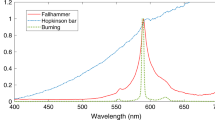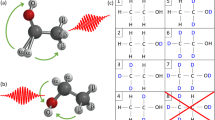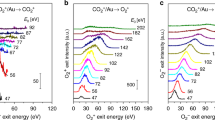Abstract
BY using true molecular beams of various hydrocarbons projected on to a platinum filament (4 mm.2 heated area) of known and controllable temperature, we have studied the primary decompositions instantaneously by pressure variations in the filament chamber, which is large compared with the filament. Similar decompositions at a carbon surface have also been studied, the carbon surface consisting of a thin layer of carbon deposited on platinum by heating a strip of the latter in a hydrocarbon atmosphere. Some preliminary results were briefly reported at the meeting of the American Physical Society in June, 19341. The inhibiting effects then ascribed to hydrogen are actually due to water.
This is a preview of subscription content, access via your institution
Access options
Subscribe to this journal
Receive 51 print issues and online access
$199.00 per year
only $3.90 per issue
Buy this article
- Purchase on Springer Link
- Instant access to full article PDF
Prices may be subject to local taxes which are calculated during checkout
Similar content being viewed by others
References
Phys. Rev., 46, 331; 1934.
M. C. Boswell, ” Mechanism of the Catalysis of Hydrogenation by Nickel”, Trans. Roy. Soc. of Canada, Sect. 3, 16, 1, later extended to platinum, ibid. 17, 1.
Author information
Authors and Affiliations
Rights and permissions
About this article
Cite this article
BEECK, O. Effect of Adsorbed Water on the Catalytic Decomposition of Hydrocarbons (by a Molecular Beam Method). Nature 136, 1028–1029 (1935). https://doi.org/10.1038/1361028b0
Issue Date:
DOI: https://doi.org/10.1038/1361028b0
This article is cited by
-
On the Role of Water in Heterogeneous Catalysis: A Tribute to Professor M. Wyn Roberts
Topics in Catalysis (2016)
-
Investigation of the selectivity of platinum catalysts on various carriers in the reaction of hydrogenolysis of methylcyclopentane
Bulletin of the Academy of Sciences of the USSR Division of Chemical Science (1967)
Comments
By submitting a comment you agree to abide by our Terms and Community Guidelines. If you find something abusive or that does not comply with our terms or guidelines please flag it as inappropriate.



